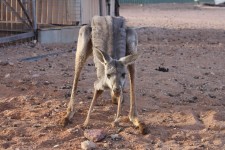'Australia's Hidden Shame - The True Roo Story' Short Film Released Today

LOS ALTOS HILLS, Calif., & ADELAIDE, Australia, February 18, 2019 (Newswire.com) - Millions of Australia’s kangaroos have died a slow painful death from starvation in the last 12 months. A confronting new short film from Coriolis Films and Ninti Media has been released today, revealing the horrific scenes of starving kangaroos in remote and regional Australia. The documentary features ecologists and indigenous leaders calling for action on kangaroo overpopulation to end the suffering of our nation’s most loved native animal. Are Australians to blame?
“Kangaroos have increased in abundance since European settlement,” explains ecologist Dr. George Wilson, who has recently published an extensive review of kangaroo welfare and land use. “Land clearance to grow grass, the increase in artificial water points for domestic animals and the removal of native predators like the dingo have all benefited large kangaroo species. We now have over 45 million kangaroos in Australia.” Largely left unmanaged, kangaroos build up to unsustainable numbers during good seasons and then when droughts arrive, they die a slow, agonizing death from starvation after denuding the landscape and causing severe overbrowsing in national parks and on pastoral leases.
Ecologist Dr. Katherine Moseby, who has worked on threatened species in arid Australia for more than 25 years, says, “Whilst some small macropod species such as bettongs are threatened, large kangaroos such as the red kangaroo and western grey are abundant and widespread. Unfortunately, our failure to keep kangaroo populations at sustainable levels is hurting not only them but our native plants, other wildlife species and our farming production.”
Kangaroo overpopulation and starvation is widespread and mass deaths are occurring on agricultural lands, pastoral stations and national parks. It is logistically impossible and ecologically counterproductive to supplementary feed millions of starving kangaroos so populations need to be managed to ensure they don’t reach these levels. Dr. John Read, who has published extensively on arid land management, says, “Kangaroo harvesting for human consumption does occur in Australia but the low demand for kangaroo meat in Australia and overseas means that prices are low and less than 20 percent of the quota has been taken in recent times. Tragically, campaigning against human consumption of roo meat by a fringe minority of ill-informed animal welfare advocates has reduced export markets and ironically reduced the capacity for kangaroo populations to be managed sustainably and ethically.” Increasing our consumption of roo meat and restoring export markets will assist in ethically managing kangaroos (according to RSPCA endorse guidelines), rather than having them culled by amateurs or left to starve to death.
Free-range kangaroos do not experience the welfare challenges of domestic stock. “Kangaroos also produce less methane than domestic stock and are an organic and low-fat alternative to other meats,” explains Dr. Katherine Moseby, urging people to do the research and decide for themselves. “Personally, I would rather eat an animal that has lived free-range and fed on natural foods and is then humanely shot rather than an animal that is kept in a shed, transported long distances, fed on processed food and then killed in an abattoir in front of its peers.”
“Australia’s national symbol deserves better, beginning with the importance of animal welfare and greater respect for kangaroos,” Professor Wilson said. Associate Professor Graeme Coulson from the University of Melbourne agrees and adds, “Potential solutions range from water point closure, dingo reintroduction, commercial harvesting and non-commercial culling, and there’s no one size fits all, depending on land-use and jurisdictions.”
The video “Australia’s Secret Shame - The True Roo Story” was produced by Ninti Media and CoriolisFilms.com, producer Dan Clarke and executive producer Johanna van de Woestijne, with assistance from Katherine Moseby and John Read. None of the participants have affiliations with national parks, pastoral production or the kangaroo harvesting industry.
More Information:
Dr. John Read, 0409534852, john.read@adelaide.edu.au
Dr. Katherine Moseby, 0407617679, k.moseby@unsw.edu.au
Professor George Wilson, 0418236575, george.wilson@anu.edu.au
Associate Professor Graeme Coulson, 0447 064 797, gcoulson@unimelb.edu.au
Fiona Garland, fiona.garland@lls.nsw.gov.au
Associate Professor David Paton, david.paton@adelaide.edu.au
Press contact: Dr. John Read, 0409534852, john.read@adelaide.edu.au; Dr. Katherine Moseby, 0407617679, k.moseby@unsw.edu.au; Professor George Wilson, 0418236575 george.wilson@anu.edu.au, and Dr. John Read, 0409534852, john.read@adelaide.edu.au
Source: Coriolis Films LLC